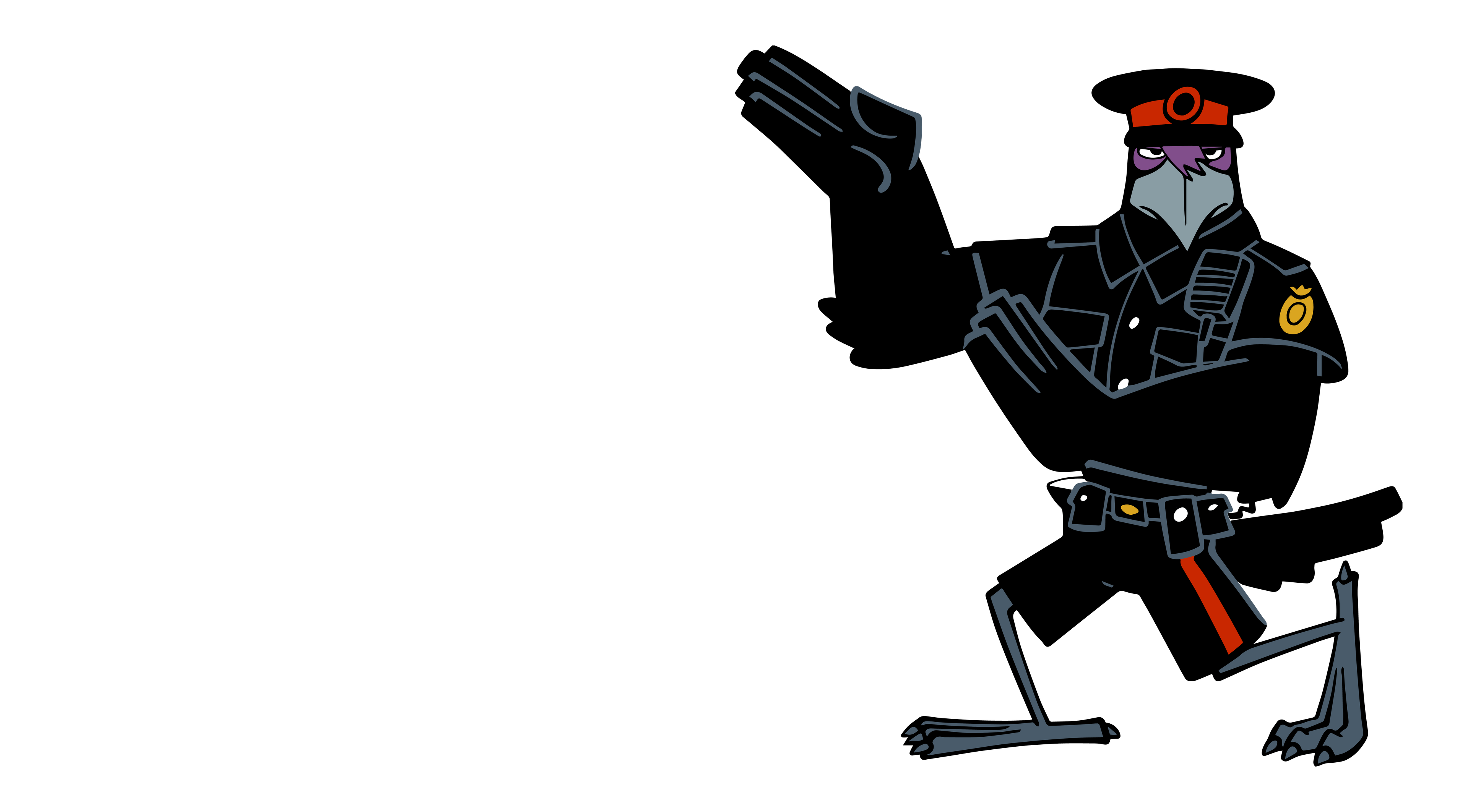Raven's Police Academy
Rights with Police
As the Honourary Dean of BearPaw U, our good friend Raven went to Police Academy – so you don’t have to! Raven graduated with, ahem!, flying colours and is now a rookie cop on the beat! Thankfully, Raven took great notes for all his cousins out there! Let's check ‘em out.

Know Your Rights!
As a citizen of Alberta, you have basic rights when interacting with the police.
Whether it’s on the street, in your vehicle, or at your front door, there are different rules for different situations.
So, when it comes to questions like “what can the police do?” or “when can I stay silent?” The answer is…that it all just depends!
We’re keeping it real with the legal facts here, but for your unique situation, it’s always best to chat with a legal pro. They’ve got the answers tailored just for you!
There are four main ways that you may interact with the police:
Understanding the rules when it comes to police interactions helps protect you, your information, and your privacy.
Standing up for your rights, and knowing them, is a good way to practice your Otipaymsowin – a Cree term that the Elders tell us means “being the boss of yourself.”
FYI, if you’re old school, like Raven, and want a print copy of this Quick Learning Guide, then order it here!
On the Street

Do you have any visible markings?
If you are out and about, walking around, haven’t done anything wrong, or there’s no investigation you’re connected to – you don’t have to answer police questions or even give your name.
It’s all voluntary.
These questions are also known as a “street check.”
So, if you are minding your own business and not breaking the law:
Street Check
Yes, police CAN ask you questions, but you are under NO obligation to answer
Street Check
Yes, police CAN ask for your name, ID, and date of birth – but you are NOT required to provide it
Street Check
However, IF you have broken a law, or if police need to issue a ticket, police CAN demand your name and ID
Any interactions you have with the police can result in your personal or identifying information being entered into a police database for future use.
Remember, exercise caution when interacting with police. Keep your cool and be respectful even if they don’t treat you fairly.
Standing up for your rights, and knowing them, is a good way to practice your Otipaymsowin – a Cree term that the Elders tell us means “being the boss of yourself.”
Carding
In 2021, the Alberta government changed the law to regulate “street checks” and stop “carding.”
The goal was to address systemic racism within the police – that means the specific targeting of people because of their race, nationality, skin colour, or economic status.
Carding
“Carding” refers to when police officers randomly request personal information from a member of the public without reasonable grounds.
Carding
Carding was a specific problem in our communities as many people were being unfairly singled out by the police.
Remember, if you haven’t done anything wrong or there’s no investigation you're connected to, it’s all voluntary!
Stopped in Your Vehicle

"Licence, registration, and any loose pieces of corn please."
Police CAN randomly stop vehicles at any time to check documentation and other traffic safety matters to determine:
- If a driver has consumed alcohol or drugs
- Whether a car is mechanically fit
- To check that a driver has a valid licence or insurance
If you are stopped while driving, the police can ask for, and you MUST provide your:
- Driver’s licence
- Car registration
- Proof of insurance
If you don’t provide the information, you can be charged!
Remember, if you are walking and get randomly stopped, you do not have to answer police questions, but in a vehicle, oh yes, you do!
Vehicle Search
If you are stopped by the police, they CANNOT search your vehicle without cause, or a search warrant.
But, they CAN look in the windows of your vehicle and may use a flashlight to do so at night.
The police are only allowed to search your vehicle if they have cause to believe:
- You have drugs
- People in the vehicle are transporting or drinking alcohol illegally
- You have an illegal weapon or one that was used to commit a crime
- There is evidence relating to the commission of a crime in the vehicle
Pro Tip: If the police hand you a valid search warrant, guess what? You DO have to let them search!
Car Accidents
If you have been involved in a car accident, you do NOT have the right to remain silent.
The police can ask you questions, and you can be charged if you do not provide answers.
Remember, anything you say to the police can be used as evidence in court!
If you are involved in car accident
Pull over safely if you can
If you are involved in car accident
Stop and remain at the scene of the accident
If you are involved in car accident
If the accident results in injury, death, or significant property damage, call 911 or report it to the police asap
If you are involved in car accident
Exchange information with the other driver, including name, address, driver's license number, and insurance details
If you are involved in car accident
If you damaged a parked vehicle or property – and the owner is not present, leave a note with a brief description and your contact information
DUI…FYI
Driving Under the Influence (DUI) of alcohol or drugs is a serious criminal offence that jeopardizes everyone’s safety – including yours.
Being charged and convicted of a DUI can impact your family, employment, education, and lifestyle.
If the police suspect that you have been drinking alcohol, they CAN make you do:
- A roadside breath test – to check the presence of alcohol
- An oral fluid test – to detect the presence of THC, cocaine, or methamphetamine in saliva, OR
- A Standardized Field Sobriety Test (SFST) – aka roadside sobriety test) – such as walking in a straight line
You DO NOT have a right to speak to a lawyer before taking a roadside test.
However, you DO have the right to speak to a lawyer before taking a breath test if you have been brought to a police station.
For more information about roadside stops and drivers rights, download the BearPaw Media and Education booklet DUI…FYI or read Impaired Driving (Government of Alberta)
At Your Front Door

"Is it just the gummies kicking in or are you a bird?"
Police are only allowed to enter your home IF they have:
- Permission from an adult (18+) in authority to enter
- A warrant to arrest someone
- A search warrant
What if it’s URGENT?
Police CAN enter your home without permission under urgent circumstances like:
- They suspect a crime has been committed against you or your property
- A 911 call was made, and entry is necessary to prevent death or serious injury
- Someone in the home needs emergency services
- To help someone who has reported a domestic assault to safely remove their belongings
- To protect people from injury
- If they suspect there is a drug laboratory in the home
Search Warrants

Raven hits the motherloade. 3-day old popcorn.
A search warrant is a court document that gives police authority to enter any place to search for ‘goods.’
Police with a search warrant must identify themselves and ask permission to come in.
If you refuse, they can enter without permission.
If you are ever presented with a search warrant, make sure to check that the address and information is accurate before allowing the police to enter.
A search warrant allows police to search your home and take certain items. Police can only search in places where they might reasonably expect to find the goods.
The ‘goods’ may include things you are not legally allowed to have, including:
- Drugs
- Weapons
- Evidence of crime
The police are expected to act reasonably in their search and cannot use excessive force or damage property without reason.
Any items seized are generally required to be returned within 3 months.
Getting Arrested

Roger's decision to keep sharing his Netflix password is really coming back to bite him now.
If you are suspected of breaking the law or being arrested, you ARE required to identify yourself.
After identifying yourself, it’s just like the movies, you have the right to remain silent!
Your rights after being arrested include:
- Remaining silent and refusing to answer police questions
- Speaking to a lawyer as soon as possible
- Privacy while speaking with a lawyer
- Free legal advice – police are obligated to provide Alberta’s 24-hour legal advice line
- A right to a Bail Hearing within 24 hours
Search Me?
In most cases, the police can only search you if you have been placed under arrest OR if you have consented to the search.
After arrest, police CAN search you to ensure their safety and find evidence.
Police may search you, your clothes and anything you are carrying.
This also includes your immediate surroundings – including your vehicle if that is where you were arrested.
But (by now you know that there’s always a but!), IF you are not being arrested, there ARE times when police can legally search you, including when they:
- Are searching for illegal drugs and believe you have drugs
- Believe you have an illegal weapon, or one used to commit a crime
Kept in Jail?
If you are have been arrested and are being detained in jail, police can search you as long as they believe that the search:
Police search
Is necessary for the safety of the police and the public
Police search
Will protect evidence from destruction
Police search
May discover evidence that may relate to your guilt or innocence
If you have been arrested and are being kept in custody, check out BearPaw U’s Understanding Bail Quick Learning Guide.
If you have been arrested and charged, but not kept in custody, you will have an upcoming First Appearance in Court. And guess what, we can Guide U on that too!
Looking for More?

Booklet
Raven’s Police Academy - Police Rights
Everything we learned here about rights with the police, but just printed!

Booklet
DUI...FYI
Get the FYI on a DUI. Learn about roadside stops, driver rights and legal limits for alcohol and cannabis.

Wallet Card
NCSA Statement to Police
The Statement to Police includes a statement you can read directly to an officer as well as a list of your rights if stopped.

Booklet
Rights When Interacting with Police
This publication is designed for handy access when dealing with the police. It lists rights when the police come to a home, stop a vehicle or make an arrest.

Website
BearPaw Media and Education
Visit BearPaw Media and Education to learn more about the law through our Indigenous Public Legal Education publications, videos, comic books and more!
This BearPaw U Quick Learning Guide is legal information only to help you understand the law better. It is not legal advice.

